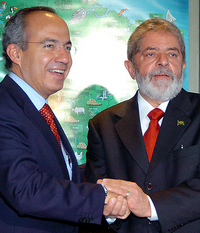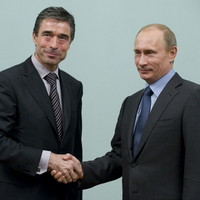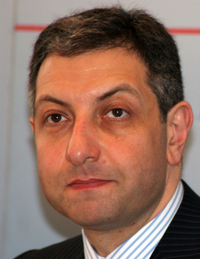Well, as you can see, I’ve changed the title a bit, because I can’t seem to limit myself to links. So think of it as “links plus.” – U.S.-Syria rapprochement off to a bumpy start. This sort of strategic reassurance to established friends is inevitable in a shifting playing field, so expectations management in the short term is in order here, especially with regard to Syria’s relations with Iran, Hezbollah and Hamas. The potential payoff is in the mid-term timeframe, if domestic politics allows the Obama administration to hold course. – The head of Russia’s ground forces said that they […]
The Americas Archive
Free Newsletter
I think the logic underlying Defense Secretary Robert Gates’ argument that Europe needs to take military force seriously again is solid, even if the idealist in me (yes, he lives) wishes the world would move closer to the European consensus against war than vice versa. The problem is that Gates, like most American defense thinkers, presents NATO as the only acceptable expression of a remilitarized Europe. And for a variety of reasons, that’s just unrealistic. To begin with, this is akin to repeatedly insisting to a lazy teenager that he has to help out around the house. No matter how […]

Drilling got underway this week off the still-disputed Falkland Islands, as an oil platform belonging to Desire Petroleum, a British company founded in 1996 for the specific purpose of oil and gas exploration in the North Falkland Basin, began operations on Feb. 22. The drilling, which is expected to last 30 days, marks the culmination of weeks of intense sparring between the Argentine and British governments over oil rights and shipping lanes in the South Atlantic. As the exploration progresses, the diplomatic battle between Argentina and the U.K. rages on. Tensions have been mounting since Feb. 16, when Argentine President […]

For U.S. Navy Rear Adm. Carol Pottenger, Haiti was a wake-up call. In the aftermath of the Jan. 12 earthquake that killed more than 200,000 people and left millions homeless on the island nation, the U.S. military deployed tens of thousands of soldiers, sailors, airmen, Marines and Coast Guardsmen to help with aid efforts. Pottenger, commander of the Navy’s nearly four-year-old Naval Expeditionary Combat Command (NECC), which oversees coastal forces, realized that almost all her 10 divisions had sent people to Haiti. “Every one of my capabilities has a piece of the action down there,” Pottenger told World Politics Review. […]
“Those of us responsible for crafting a new Strategic Concept do face a great challenge and a great opportunity. The phrase “post-Cold War” says more about what our current era is not than about what it is or should be. All of us here today will help define what this new era will become.” -Secretary of State Hilary Rodham Clinton, NATO Strategic Concept Seminar

Latin America’s major economies avoided the brunt of the global financial crisis, except for Mexico, whose 7 percent contraction in 2009 represented the region’s worst decline. The drop-off was primarily traceable to America’s recession: More than 80 percent of Mexico’s exports go to the U.S., and its major sources of foreign reserves — oil, remittances and tourism — depend heavily upon consumption north of the border. The loss of tourism revenues due to ongoing drug violence within Mexico and the emergence of H1N1 didn’t help matters. This year, as the panic subsides, Mexico’s economy is expected to return to positive […]
I drew a comparison earlier this week between the transfer of power in Nigeria with what occurred in Honduras last year, noting the radically different international reactions in the two cases. We might have an even better comparison today, in the form of Niger’s military coup to remove President Mamadou Tandja from power. The coup comes after Tandja had dissolved parliament and amended the constitution last year to remove term limits that would have disqualified him from seeking re-election. My hunch is that beyond the perfunctory condemnations (the AU and ECOWAS have already offered theirs), we won’t hear much outrage […]
I’ve mentioned a number of times the ways in which France’s nuclear energy giant, Areva, has benefited from the U.S. opening foreign markets to nuclear energy. The U.S.-India 123 agreement is the most flagrant example, since it really involved bringing India in from the NSG cold. So it’s worth noting that among the beneficiaries of President Barack Obama’s new nuclear energy initiative is none other than . . . Areva. They’ve been partnering up with U.S. utility and nuclear power companies for the past few years in anticipation of the U.S. shift to nuclear. And part of their strategy of […]
I don’t make a habit of writing about things that seem obvious. Torture, for instance, is morally reprehensible and pragmatically ineffective, which is as close to a definition of un-American as I think you can come up with. Once you get caught up in trying to define the gray area, you’ve missed the point. Same goes for DADT, in my book. I won’t write about it often, because to me, there’s just not a whole lot of ground to cover before you run into the basic injustice of the policy. But I bring it up because of this TPM article […]
President Barack Obama announced more than $8 billion in loan guarantees for two new nuclear reactors, saying that the money will go to creating a clean energy sector that also generates hundreds of thousands of domestic jobs. This trend toward nuclear energy is being seen worldwide and is outlined in greater detail in WPR’s recent feature, Green Power: Geopolitics After Oil.
In what seems like a blast from the past, Argentina is raising the tone in its never-abandoned claim to the Falkland Islands. In all fairness, that sort of thing does tend to happen when ocean-bed oil reserves are discovered in disputed territorial waters. And for now, the first recourse mentioned is taking the matter to the U.N. So even if Argentina has warned it will take “all necessary steps” to defend its claim, a Falklands War 2.0 hardly seems imaginable today. But then again, it hardly seemed imaginable the first time around, either. No matter how the actual dispute does […]

The Group of Experts assisting with the drafting of NATO’s new Strategic Concept traveled to Moscow last week, in an effort to reassure Russia about NATO and its activities. The Feb 9-11 visit followed the release of Russia’s new military doctrine, adopted on Feb. 5, which characterizes the alliance’s activities as threatening to Russia. Led by former U.S. Secretary of State Madeleine Albright, the group, consisting of a dozen members, consulted with Russian Foreign Minister Sergei Lavrov, National Security Secretary Nikolay Patrushev, and members of the Russian parliament, and held additional meetings with other Russian security experts. Albright also delivered […]

Biofuels were hailed in the first half of the last decade as a green solution to reliance on imported petroleum, and a savior to farmers seeking higher prices for commodities in surplus. But in the second half of the decade, biofuels emerged as real and imminent threats to both environmental quality and food security, while being a costly and ill-conceived response to energy concerns. Agriculture and energy ministers met at a high-level conference at the Food and Agriculture Organization (FAO) in Rome in June 2008, and essentially glossed over these issues in endorsing continued government subsidies to the biofuels question. […]
I couldn’t help but notice the stark difference between reactions to last week’s transfer of power in Nigeria (not a peep) and reactions to last year’s political crisis in Honduras (hemisphere-wide condemnation). Say what you will about the optics of how Honduras’ former President Manuel Zelaya was removed from office, but in constitutional terms, it was by the book. Compare that to Nigeria, where the parliament’s vote to transfer presidential powers to Vice President Goodluck Johnathan was clearly extra-constitutional. For now, opposition to the move, both within the executive branch and among the opposition, has been contained. But given the […]
Following President Barack Obama’s surprisingly successful question-and-answer session with GOP legislators a week or so ago, some commentators and politicians suggested that such impromptu encounters should be more frequent, comparing them with the British prime minister answering weekly questions in the British House of Commons. Judging by Monday’s White House talks between the president and the Republicans on pressing domestic issues facing the nation, the constructive tone of that earlier dialogue would seem to have been a flash in the pan. But just for the sake of argument, could there be a case for a regular public “question time” of […]
At a Feb. 5 session of the Russian Security Council, President Dmitry Medvedev finally approved Russia’s updated comprehensive military doctrine, which was published on the president’s Kremlin Web site the following day. But notwithstanding a lengthy period of discussion and consideration, and despite all the developments of the past decade — including the wars in Afghanistan, Iraq and Georgia — the latest version generally supports the same policies as the previous military doctrine adopted in 2000. The doctrine depicts Russia as the target of increasing military threats emanating from NATO collectively and its members individually. It also expresses unease at […]

TBILISI, Georgia — Former U.S. President George W. Bush has a highway named after him in Tbilisi, Georgia’s charming and gritty capital, to commemorate his lofty rhetoric in praise of the Caucasian republic’s Western turn in 2003. During Bush’s visit in 2005, the president even eschewed his famous early bedtime to dance the night away in the jubilant Georgian capital. Much has changed since 2005, though. When Russian tanks rolled into Georgian territory in August 2008, Bush chose not to rise to the defense of the West’s ally in the Caucasus. But that was just the beginning. From the indignity […]
